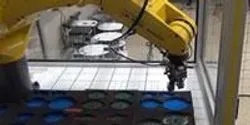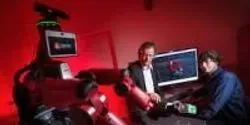Robotics

Neural prosthetic devices implanted in the brain's movement center, the motor cortex, can allow patients with amputations or paralysis to control the movement of a robotic limb—one that can be either connected to or separate from the patient's own limb. However, current neuroprosthetics produce motion that is delayed and jerky—not the smooth and seemingly automatic gestures associated with natural movement. Now, by implanting neuroprosthetics in a part of the brain that controls not the movement directly but rather our intent to move, Caltech researchers have developed a way to produce more natural and fluid motions.

As nanotechnology makes possible a world of machines too tiny to see, researchers are finding ways to combine living organisms with nonliving machinery to solve a variety of problems.

Ocean researchers like to say we know less about the Earth’s seas than the moon. With less than 5 percent of the world’s oceans explored, big discoveries await. To find them, University of Rhode Island students are learning to build the next generation of autonomous underwater vehicles, or AUVs, used to map seafloors, study ocean movement, locate sunken objects, research sea life and more.

Eve, an artificially-intelligent ‘robot scientist’ could make drug discovery faster and much cheaper, say researchers writing in the Royal Society journal Interface. The team has demonstrated the success of the approach as Eve discovered that a compound shown to have anti-cancer properties might also be used in the fight against malaria.

Many people imagine robots today as clunky, metal versions of humans, but scientists are forging new territory in the field of 'soft robotics.' One of the latest advances is a flexible, microscopic hand-like gripper. The development could help doctors perform remotely guided surgical procedures or perform biopsies.

One has experience working with robots in space. The other two have experience in areas associated with mining, including mineral processing and rock mechanics. Together, these three researchers from West Virginia University will work to create a system that will provide NASA data on asteroids.












